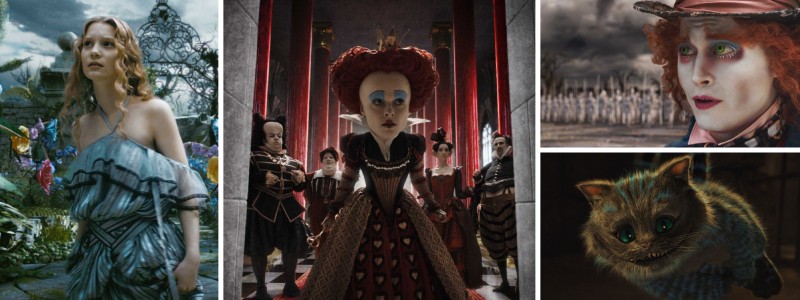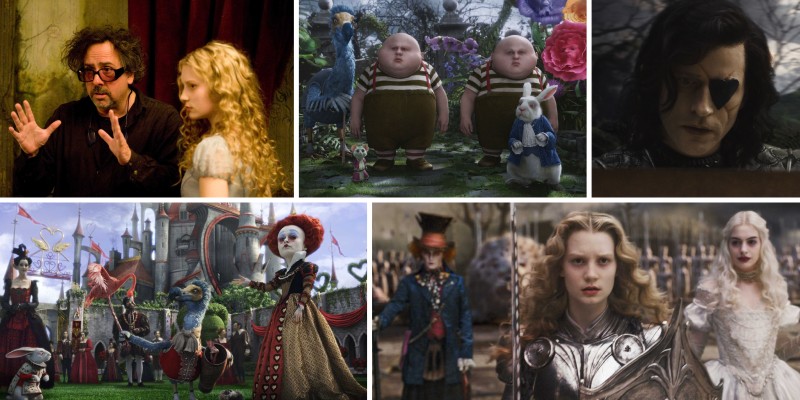You can’t keep a good myth down. It’s a little hard to define exactly when and in which form Lewis Caroll’s stories Alice’s Adventures in Wonderland and Through the Looking Glass broke free from their formal origin as children’s novels, and became something more potent. Over fifteen movie adaptations alone have been produced throughout the 20th and now 21st century — Alice has never been truly out of our minds, and her story has become entrenched in our culture.
We all know it, almost by heart: a young girl sees a white rabbit with a pocket watch, follows it down a rabbit hole, and enters a strange new place — a Wonderland — filled with shrinking potions & growth-inducing cakes, enigmatic felines, madmen, and deadly monarchs. Like a lot of you I read the books as a child, and have seen their characters — and characters inspired by them — so many times in popular culture that now I know the work more by its echoes than by any original text. There’s always confusion as to how it ends, of where exactly in the sequence of tea parties, flamingo-powered croquet, and beheadings, but then you remember: she wakes up.
It was all a dream.
Tim Burton’s Alice in Wonderland could have been a straightforward telling of this tale, a sugary 3D confection spun from the finest the House of Mouse can muster, laced with the sharp tang of Burton’s signature dark visual style for adult-pleasing flavour — and in many ways, it is. But is also so much more.

Burton and writer Linda Woolverton bring to this version the same slightly left-of-middle take on the tale that made his Willy Wonka memorable and independent from its previous version. This is less an adaptation or a re-imagining than a remix. Alice is now 19 years old, about to enter into a marriage of convenience. She’s grown up having the same dream every night, of white rabbits and playing card armies, and when things come to a head and these visions start to infiltrate her very real world, she decides she ‘needs a moment’ and promptly leaves her would-be fiancee at the, er, gazebo, and follows the white rabbit down the hole.
The central conceit that most versions of this story have played on — that it is all a dream that can therefore be woken up from — is immediately done away with. This is very much a real place, no longer the Wonderland of a little girl’s dreams, but a fractured Underland.
And as a place, Underland is beautiful. It’s classic Burton, all craggy edges and baroque Victorian design, but it is skilfully executed. It’s a fun watch in 3D as well, though the technology still leaves me with a dull headache (and it can’t handle very fast motion on small elements on screen). It’s actually more impressive to note that the photographic elements of the film were shot with ordinary 2D cameras and post-processed into 3D; I saw no difference in quality between it and the 3D camera-shot Avatar (if anything Alice‘s humans were less flat), and that gives me hope for next month’s Clash of the Titans, which is also converted to 3D after the fact, so to speak. Nevertheless, if it is not playing in 3D where you live you needn’t feel shortchanged, as what is onscreen is plenty beautiful to look at without the extra illusion of depth (and the bump in ticket price).
The visuals of the film aren’t so much indulgent and over-the-top — as in Avatar — as they are assured. It’s less flashy than the 21st century CG-heavy blockbuster has weaned us to expect, and it’s the better for it. There are several smart little touches. My favourite is the fact that the Cheshire Cat (voiced by Stephen Fry) doesn’t really float or bob about; he just hangs there in mid air, curling around as if the laws of physics just do not apply to him. It’s a subtle, unnerving choice, and that’s exactly how a Cheshire Cat should be.
In many ways it’s a simpler, more straightforward fantasy movie of the kind that existed before someone married the massive special effects style of a Star Wars with a swords & sorcery plot to produce the Lord of the Rings films (that man is Peter Jackson, but more about him some other day). Alice does have a firm grasp on its identity as a blockbuster — things do eventually end up in a great big battle — but throughout it’s handled in a quiet, story-book style. This may perturb a lot of people expecting some kind of grand epic, but for old-school, low-budget fantasy movie fans like me, it’s a welcome return to form for the genre.
The characters as well are handled with wit and a light touch. Johnny Depp’s Mad Hatter is not Depp playing at Heath Ledger’s Joker as I feared, but like his Willy Wonka a layered person who’s fleshed out with a surprising amount of subtlety. It’s always easy to think of the Hatter as an ordinary man gone mad, but Depp manages to convey that he is an Underlander gone mad — a very different thing. As the feuding monarchs, Anne Hathaway and Helena Bonham Carter play things the closest to the pop culture surface; Hathaway as a head-in-the-clouds ingenue channeling Nigella Lawson, and Bonham Carter as the amalgamation of every spoiled celebrity rolled into one — literally a bobble-headed caricature.

It’s this sly incorporation of modern day references (unlike the Shrek movies it never calls attention to them) that becomes one of the major successes of the story. About the only problem is that it doesn’t want to show us more. The movie runs a brisk 109 minutes, and you get the feeling a lot of it was left on the cutting room floor. There are a few missteps in pace, and characters not given as much space to breathe as I would like. I would gladly have sat down for another hour of this, even with the 3D-induced dull headache.
But it’s Mia Wasikowska’s Alice that holds it all together despite the flaws. From the get-go I felt unusually familiar with the actress despite having never seen any of the work she’d done. She holds your interest with performance that is certainly self-aware but never dishonest, and holding your own when onscreen with Johnny Depp is an achievement in itself!
Tim Burton’s take on Alice in Wonderland could have gone the usual route of throwing in everything and the kitchen sink. Instead of updating the original or sticking slavishly to its text, he’s recognised that Alice exists as much in our consciousness as it does in Caroll’s novel. Folding all those many cinematic and influenced versions — from Disney’s own animated classic to The Matrix — and yet making it a solid tale that stands on its own feet, is perhaps its biggest triumph.
This is not the Alice in Wonderland movie to end all Alices. But it is a great telling of a classic tale, both of its time, and timeless.


